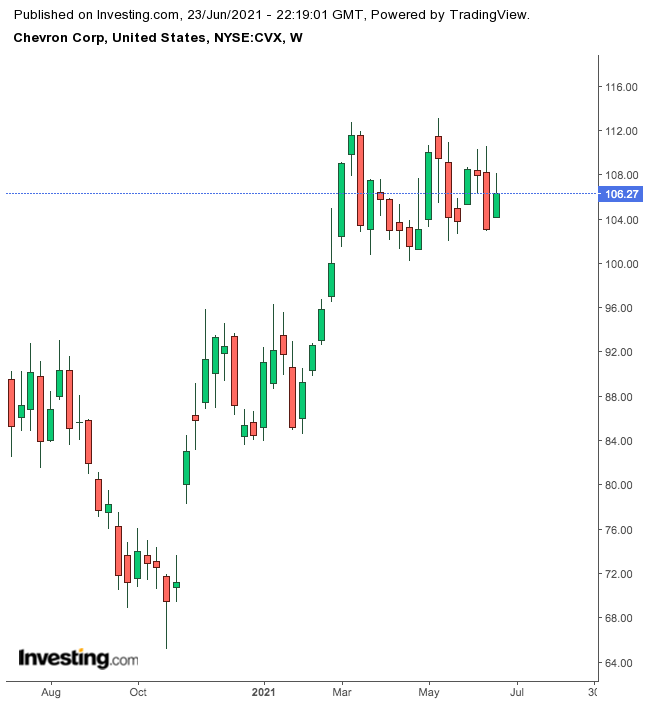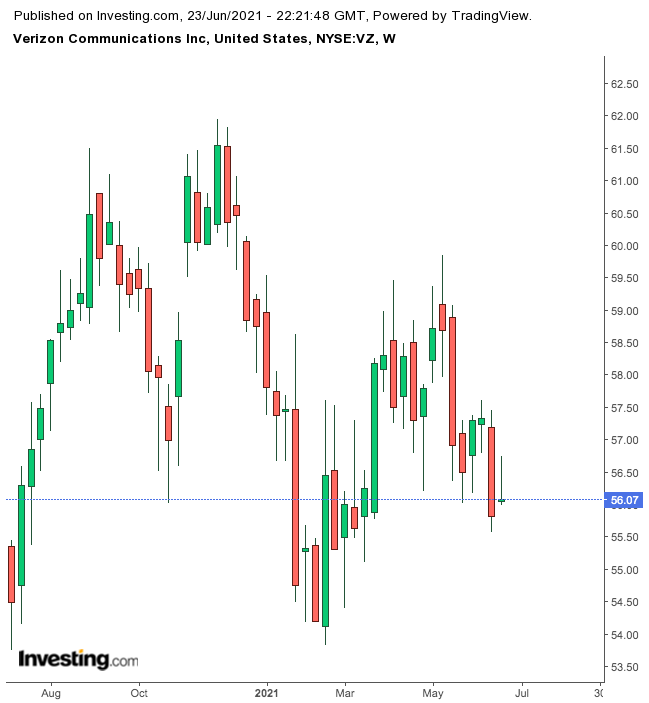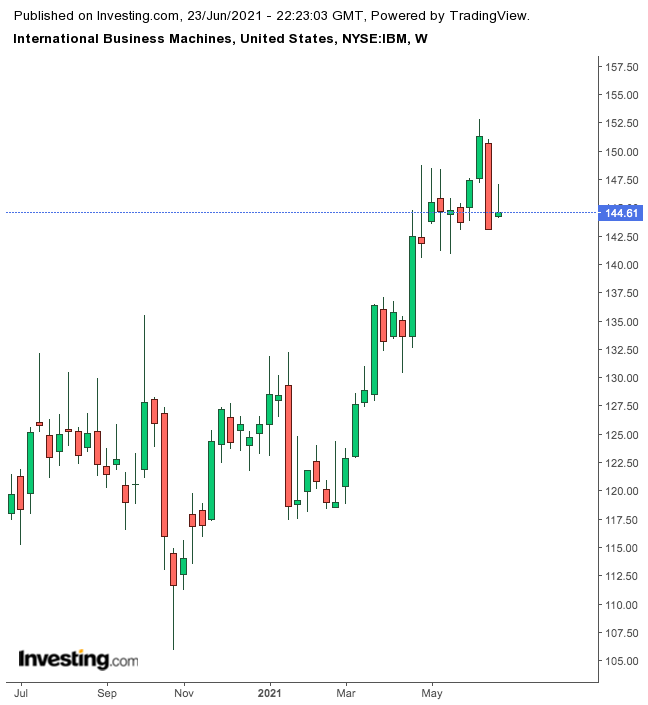If you are on the hunt to earn higher dividend yields in this low interest-rate environment, you don’t have many choices. After a strong rebound in equity markets since the pandemic crash, the average dividend yield offered by S&P 500 companies is about 2%.
But if you want to beat that return while remaining in a safe zone, you can invest in the top-quality, blue chip stocks that are included in the Dow Jones Industrial Average. Today, we look at the three highest-yielding stocks represented in this index to analyze if they could be a good fit for your income portfolio.
1. Chevron
Dividend Yield: 5.1%
Quarterly Payout: $1.34
Market Cap: $205 billion
While the best time to buy quality oil stocks is certainly behind us in the current cycle, some of these names continue offering a bargain to yield-hungry investors.
The U.S. oil giant Chevron (NYSE:CVX) is still offering a yield that is more than double the S&P 500’s average yield. As the global economy reopens and demand for energy products increases, Chevron is in a much better position to cover payouts from its cash generation than borrowing from the market.

Of the five super-majors, Chevron has the best balance sheet and strong prospects for a share buyback. The California-based company said in March that it should generate $25 billion of free cash over and above its dividend through 2025 if Brent crude remains at $60. Brent crude prices rose above $75 a barrel for the first time since April 2019.
But know that if you’re picking an oil major for your income portfolio, you should get ready for a bumpy ride. Global commodity markets have just gone through the most turbulent year in their history due to the pandemic. While the successful rollout of vaccines is allowing economic activity to return close to normal in many developed countries, the long-term outlook for oil demand remains uncertain.
An uneven recovery in fuel consumption, a lack of investment in new oil fields and the disruption caused by the transition to low-carbon energy are likely to keep these markets volatile.
2. Verizon Communications
Dividend Yield: 4.52%
Quarterly Payout: $0.63
Market Cap: $234 billion
Telecom operators are considered reliable dividend stocks. No matter what direction the economy goes, internet and wireless connections will be among the last items consumers delete from their must-have lists. This predictability and stickiness increases their income appeal for long-term investors.
In this space, Verizon Communications (NYSE:VZ) is a good pick, particularly for retirees. The company has a solid track record of rewarding investors via dividends, which have grown since 2007. The company currently pays $0.63 a share quarterly, which translates into an annual yield of 4.5%.

CEO Hans Vestberg is cutting investments in risky areas, like media, to fully focus on network expansion, riding a wave of new 5G technology that provides a huge leap forward in speed, capacity and connectivity. Last month, the company agreed to sell its media division, which includes AOL and Yahoo, to Apollo Global Management (NYSE:APO) for $5 billion.
The company told investors recently that its 5G network will cover 100 million people by year-end and provide coast-to-coast coverage by 2024. That expansion will help the carrier double its revenue growth to 4% by 2024.
One negative to investing in telecom companies is that they don’t provide much space for capital gains. These stocks are defensive in nature and help retirees in times of economic distress.
3. IBM
Dividend Yield: 4.47%
Quarterly Payout: $1.64
Market Cap: $130 billion
International Business Machines (NYSE:IBM) is another Dow stock that offers a higher dividend yield. The 109-year-old tech giant has hiked its payouts for 25 years straight.
Even with that remarkable performance on the income front, IBM stock is a risky bet due to the business challenges the company is facing. The Big Blue has been slow to restructure at a time when demand for its large-frame servers and other hardware plunged and its clients began storing data on cloud services provided by rivals like Amazon (NASDAQ:AMZN) and Microsoft (NASDAQ:MSFT).
But there are some clear signs that the this New York-based company is succeeding in its turnaround efforts, making its 4.5% dividend yield attractive for long-term investors. IBM posted its first revenue gain in 11 quarters in April, driven by demand for cloud services. IBM also reported revenue from Red Hat, which it bought in 2019 for $34 billion, increased 17% in the first quarter.

Arvind Krishna, who took over as CEO from Ginni Rometty last April, is focusing on artificial intelligence and the cloud to revive growth. Krishna has reorganized the company’s business around a hybrid-cloud strategy, which allows customers to store data in private servers and on multiple public clouds.
But these gains can evaporate quickly if the company fails to compete in the highly competitive cloud-computing market, where giants, like Amazon and Microsoft, have already made significant headway.
Bottom Line
The above stocks offer investors some choices from different sectors of the economy to earn a higher return in this low-rate environment. Their strong balance sheets, long histories of rewarding investors and solid positions in their industries make them less risky picks for the income-seeking investors.
